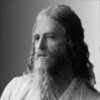In our modern age, we often imagine we are too sophisticated to believe in myths. We scoff at the beliefs of previous eras, when supposedly superstitious people told fairy tales about supernatural forces that influenced human events. It’s not entirely a bad thing that we are more rational; none of us would benefit from returning to a time when it was held the Earth was the center of the universe, or that volcanoes could be kept calm by sacrificing virgins into the lava. However, the loss of appreciating myth has harmed our sensitivity to the deeper, more profound powers inherent in life. For instance, a fire will burn if it is not prayed over, but without prayer we likely fail to appreciate its beauty and glory.
In our bravado, we have developed a blind spot whereby we fail to see how certain myths still permeate our lives. We have elevated the rational to the point where what is not seen or heard is considered non-existent. The problem with this is the failure to appreciate that myths are not ontological truths; they are pointers to a deeper reality that the cognitive mind cannot perceive. The development of myth reflects an innate human need which takes place in every culture, whether it is deliberate and recognized, or not.
The result of our contemporary derision is that we have ended up developing a myth so powerful we fail to perceive it is even a myth, or that it is optional. Our participation in it is so widely held, and enforced overtly and covertly in constant fashion that we do not even know we are living in a world of collective belief. And, when we engage in a myth without realizing we are doing so, we lose our free-will; our power to choose the very nature of our consciousness.
I am talking about the myth of “The Thinker.”
A de facto belief has grown that we are individual people who generate our own personal thoughts. But, this is not a truth held across all time and accepted by all cultures. The yogic model states that thinking is an event that occurs in the mind, but you are not your mind. You are consciousness, and you are choosing certain thoughts. It’s somewhat akin to sitting down in a restaurant and picking items from a menu. Consciousness is a light that shines, and from its very depths we are opting to illuminate certain patterns of thought.
Much of this takes place in what is known as the sub-consciousness. The very nature of the term is indicative as to what is occurring; is beneath your current awareness. Even the recognition of the phenomenon of sub-conscious activity is rather recent in the Western world, having its origin with the work of Freud. Freud, however, failed to appreciate that the dynamics he uncovered were not universal, they were particular to his day and environment. He also failed to recognize, for lack of a better term, super-consciousness; the aspect of the human psyche that can choose to “pick from the menu” ideas that originate in the higher, divine realms.
The problem with the myth of “The Thinker” is that it subtly reinforces a human condition of fear, loneliness and confusion. There seems to be no escape from the obligation to perseverate about what we do not want. From a certain perspective, this is accurate since it is impossible to stop thoughts at the level at which they occur. The mind becomes like a spinning fan. Halting unwanted mental activity cannot be accomplished by sticking ones arm in between the blades. It can only slow down and stop when the cord that supplies the power is unplugged.
From a practical standpoint, there’s no benefit to arguing with thoughts, either your own or of others. The wilted plant needs nurturing, not scolding. You may have noticed the phenomenon of online discussion where someone types their opinion in all caps, with multiple exclamation points; as if only if they state their opinion boldly enough will it will convince those who think differently. We perform in the same manner internally as we attempt to improve our thinking through restraint and will-power. These are ineffective strategies for healing and bringing about lasting change because the mind is not the origin of thought. Again, it is consciousness which has the power to choose.
Listening to negative thoughts is like listening to music you don’t enjoy. Playing with the volume knob won’t bring about real change. What is required is the recognition of the inherent power of consciousness to choose differently; to change the station.
If we get on a train, we are more or less stuck until it reaches the next station. A train of thought, however, can be disembarked at any time. It really is a matter of choice. Just because something has become habitual doesn’t mean it is permanent. Just because we have a history of engaging in negative thinking doesn’t require us to continue. Come back to consciousness, to awareness prior to thought, and from here board whatever train that runs down a set of tracks that you find fulfilling.
From a practical standpoint, appreciate the acceptance of the power of choice will be a process. The mechanism to return choice to consciousness is through intuition, called “buddhi” in yoga. The intuition is the ability to know directly without processing information. It operates on wisdom, not knowledge. Many of us spend so much time perusing thought that our intuition has become weak. But, like any muscle that may have atrophied, it can be strengthened by exercise, by repeated practice.
In my personal experience, when I am stuck in negative thought patterns, I revert to one of my principal practices: forgiveness. Through meditation, I ruthlessly probe my mind for any lingering grievances, and then engage in prayer as means to elevate my intuition and shift from thinking to consciousness. My prayer is something simple, like, “I know I am currently stuck, this is making me miserable, and I want to let this go. The pain is not worth the indulgence.” I have been consistently wowed at how effective this can be.
The myth of “The Thinker” is so pervasive while being accepted as absolutely true and valuable, that we are likely influenced by it without knowing. We are often participating in it without deliberate decision. Like all myths, if it is working on helping you fulfill your potential as you define it, then continue on this way. If, however, you have found it is bringing you stress and suffering, please consider a different path. Exercise your intuition, choose to forgive and let go of the negative mind, and discover that, perhaps, your own consciousness will bring the ease, adventure, and fulfillment you have been seeking.




